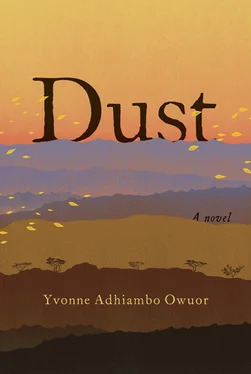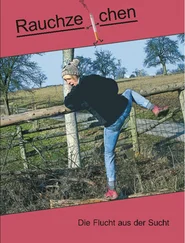Nyipir had started an alternate existence by bartering intelligence. Sudan, Somalia, Ethiopia, Eritrea, and Uganda paid for Nyipir’s knowledge. He had trained ragtag platoons, sold secret passageways through the northern frontier, used his windfall to buy the first set of guns, which he sold at the border for a 2,500-percent markup, with which he bought more guns.
Galgalu had been the message carrier, the chameleon who changed colors and helped distract Nyipir’s pursuers. It was easy, their first cattle raid. They returned with a hundred head of Karamojong cows. Half were dispatched on lorries to middlemen who turned them into supermarket beef. An escalation of rustling. New tactics, new routes, new keeping areas out of the reach of the state. The rustling diverted attention from the business of helping arms flow across boundaries and landscapes. He had launched his reprisals against Kenya. This was a private war that had its center in Wuoth Ogik. “Remember, Galgalu?” Panting, Nyipir only stopped murmuring when he reached the mission’s white gate.
With Galgalu being treated, Nyipir Oganda embarked on another journey, changing into one of his old police uniforms for this. He stumbled, a weary man navigating the vastness. The uniform hung loosely on his body. He walked and walked until, eighty-eight kilometers later, he reached Ali Dida Hada’s former police post. It was just more than a day and half later.
Aaron Chache, Ali Dida Hada’s replacement at the police post, was a lugubrious, long-jawed officer-in-exile who started to sweat when he saw Nyipir shimmer into view, dust behind him, a curtain of flies ahead of him. In that moment when day struggles not to relinquish light to darkness, Aaron had raised his hands in surrender, submitting to unfair fates even before they had stated their purpose, the extent of his defense a choked “Ashindwe!”
Begone, Satan!
He had not planned for this in his career strategy. He had not anticipated needing to cling to sanity in an arid land. The previous morning, Aaron had dreamed of a banana salad. Just as he was about to put a spoon of pineapple, mango, and banana into his mouth, he woke up. The sun had reminded him that his fruit of the day, of every day, was the doum-palm nut.
The apparition spoke. “I am retired senior sergeant Aggrey Nyipir Oganda. I’m here to report a crime.”
“Aaron Chache.” A broad, gum-revealing grin of gratitude that it was a human being addressing him. “Karibu, karibu, karibu.” He wrung Nyipir’s hand. “Where did you serve? Shall we go inside?”
Nyipir, dully: “ASTU.”
“Eh!” Aaron’s eyes shone with awe. “Anti-Stock Theft Unit!”
Inside the tin shack, with sparse thatch on its roof, Aaron shoved a pile of assorted confiscated items and cultural paraphernalia to the ground, hunting for his imitation pith helmet, adjusted its insignia, and wiped his wrinkled uniform. Law-by-correspondence-school books were on the floor against the metal walls. A sixteen-year undertaking. The holes in the tin allowed in a rare breeze. The heat was already unbearable. A faded Kenyan flag slouched on a too-small brass pole. A framed map of Kenya with colorful pins sticking in a perpendicular pattern barely hangs onto the wall. A shelf with some school and world literature stood in the back of the room, and two blue lanterns, one with a broken glass cover, sat on a table next to it. The color portraits of three presidents formed a triumvirate. Next to this was a picture of Aaron in a topi hat, with a hand on his blue-frocked wife and two boys and three girls, who wore maroon-and-white school uniforms. The camera had captured the sense of family occasion.
“Sit! Sit! Sir!”
Nyipir took the wooden stool, adjusted it, and sat. No preamble. “My home was invaded, my animals stolen, dry season grass burned. Nothing left. If we leave now, we can find the animals.”
Aaron’s cleaning efforts ceased as he retreated into a torrent of regret, self-pity on its heels. He had been reduced to serving in this wind-wailing blot of landscape. His chief purpose was to hunt for lost cows. Being here had amplified his aversion to cows. The way they looked, chewed grass, and mooed. Their sense of entitlement, ambling around and expecting people to move or worship them, their gross dung. He would use his salary to import ravenous lions from Amboseli and dispatch these to every homestead. He also despised camels — they looked down on him with a superior grin. He longed to pluck out their eyelashes before setting them alight. He would soak the beasts with paraffin first. And if he could without being lynched, he would stomp every goat he met to death. He regretted their existence. He detested sheep, their dumb silliness and stupid, startled looks. He had to check his pistol every time one of those things crossed his path. Sheep shooting could be a national sport. He was indifferent to donkeys, even though he considered their braying diabolical. He was confused about his unresponsiveness to donkeys; he thought about it a lot. Maybe they were a last-resort means of trotting out of town.
Aaron had plenty of time to regret many things. The absence of regular fruit. Few opportunities to speak proper English, no one with whom to explore motivations in the poetry of Elizabeth Barrett Browning. He found great solace in the words of Browning’s “Chorus of Eden Spirits,” but he regretted that there was nobody to tell about the meaning of this relief. Most of all, he regretted that Thursday in August, on an extension of the Naivasha — Nakuru road, when he, a traffic policeman, and three others, who had prosecuted random traffic offenders without a receipt book for three years undiscovered, were found out.
In the three honeyed years, he had reaped sufficient sums to extend the boundaries of his farm and buy a Chinese lorry. But that Thursday, new zealous plainclothes officers of the Anti-Corruption Authority had driven past his special roadblock, in an aged red farmer’s van.
Easy prey, he had thought. He had handed over the shakedown to one of the others. But the trap was sprung. Hearing a commotion, he had realized what was happening, and tiptoed behind the van as his fellow officers were being rounded up. He climbed up a nearby fossil-looking weeping-willow tree and stayed there all night. When he clambered down, very early the next morning, and made his way to work to attempt some damage control, he discovered that the officer commanding his division had already arranged for his transfer to the outer northern margins of Kenya.
Aaron had left without protest. He still had a job. He needed the pension to extend his banana plantation and plant guava trees.
“One day at a time,” his wife, Domtilla, had comforted him.
He snapped into alertness, shifting under Nyipir’s red-eyed scrutiny.
“Ehe?” He urged Nyipir’s story out, grateful to be able to speak English in complete sentences. The stories, however, depressed Aaron. For some reason he was expected to insert himself into the narratives as “primary problem solver.” Such stories invariably featured cows. He hated cows. He lifted his hand for a pause.
“Insurance?” he chided, using his teaching tone. No one here bothered with livestock insurance. But he asked the question anyway to “help locals change their behavior.” Nyipir’s glare rather curdled his blood. Never mind. Some people were “late adopters.” “Go on,” he urged Nyipir. And then the words “Wuoth Ogik” chimed like a bell inside his skull.
Hope struck Aaron. Wuoth Ogik was synonymous with his predecessor, Ali Dida Hada, in security parlance. Aaron now reached across his table to tap the 1960s radio unit. He could make this Nairobi’s problem. Maybe Ali Dida Hada could return, and he, Aaron, could negotiate a posting to Kinangop or Masaba or Nyakach, where grass was green and streets were lined with guavas and oranges. And pineapples. And bananas. And tangerines.
Читать дальше











